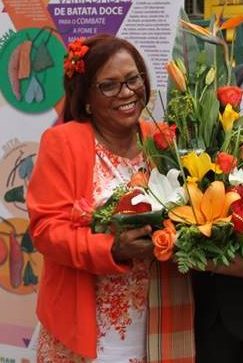Maria Andrade (scientist)
Maria Andrade is a prominent agricultural scientist known for her significant contributions to the development of drought-resistant sweet potato varieties in Sub-Saharan Africa. Her work has been instrumental in improving food security and nutrition in regions severely affected by climate change and drought conditions. Andrade's efforts have not only enhanced the livelihoods of thousands of smallholder farmers but have also earned her international recognition, including the prestigious World Food Prize.
Early Life and Education[edit | edit source]
Maria Andrade was born in Cape Verde, an island country that has faced its own challenges with drought and food scarcity. From a young age, Andrade was acutely aware of the issues surrounding food security in her community, which fueled her passion for agricultural science. She pursued her higher education in the field, earning a Bachelor's degree in Agronomy from the University of Havana, Cuba, followed by a Master's degree and a Ph.D. in Plant Breeding from North Carolina State University, United States.
Career[edit | edit source]
After completing her education, Andrade dedicated her career to addressing food security issues in Sub-Saharan Africa. She joined the International Potato Center (CIP) as a sweet potato breeder for Mozambique, where she focused on developing varieties that could thrive in the arid conditions prevalent in the region. Her work involved extensive field research, collaborating with local farmers to understand their needs and challenges, and developing breeding strategies that would lead to improved crop yields and nutritional outcomes.
Achievements[edit | edit source]
One of Andrade's most notable achievements is the development of the Vitamin A-rich orange-fleshed sweet potato (OFSP), which has been a game-changer in combating vitamin A deficiency (VAD), a major public health issue in many African countries. The OFSP varieties developed by Andrade are not only drought-resistant but also have a higher nutritional content, providing a sustainable solution to malnutrition and food insecurity.
In recognition of her contributions to agriculture and food security, Maria Andrade has received numerous awards and honors, including the World Food Prize in 2016. This accolade is often referred to as the "Nobel Prize for Food and Agriculture" and highlights the global impact of her work.
Impact[edit | edit source]
Andrade's work has had a profound impact on the lives of millions in Sub-Saharan Africa. By improving the resilience and nutritional value of sweet potatoes, she has helped ensure that vulnerable populations have access to a sustainable food source. Her efforts have also empowered women farmers, who play a crucial role in agricultural communities, by providing them with the resources and knowledge to improve crop production and achieve food sovereignty.
Future Directions[edit | edit source]
Looking forward, Maria Andrade continues to focus on the challenges posed by climate change to agriculture in Africa. She is involved in research and development projects aimed at creating even more resilient crop varieties and sustainable farming practices that can withstand the environmental challenges of the future.
See Also[edit | edit source]
Search WikiMD
Ad.Tired of being Overweight? Try W8MD's physician weight loss program.
Semaglutide (Ozempic / Wegovy and Tirzepatide (Mounjaro / Zepbound) available.
Advertise on WikiMD
|
WikiMD's Wellness Encyclopedia |
| Let Food Be Thy Medicine Medicine Thy Food - Hippocrates |
Translate this page: - East Asian
中文,
日本,
한국어,
South Asian
हिन्दी,
தமிழ்,
తెలుగు,
Urdu,
ಕನ್ನಡ,
Southeast Asian
Indonesian,
Vietnamese,
Thai,
မြန်မာဘာသာ,
বাংলা
European
español,
Deutsch,
français,
Greek,
português do Brasil,
polski,
română,
русский,
Nederlands,
norsk,
svenska,
suomi,
Italian
Middle Eastern & African
عربى,
Turkish,
Persian,
Hebrew,
Afrikaans,
isiZulu,
Kiswahili,
Other
Bulgarian,
Hungarian,
Czech,
Swedish,
മലയാളം,
मराठी,
ਪੰਜਾਬੀ,
ગુજરાતી,
Portuguese,
Ukrainian
Medical Disclaimer: WikiMD is not a substitute for professional medical advice. The information on WikiMD is provided as an information resource only, may be incorrect, outdated or misleading, and is not to be used or relied on for any diagnostic or treatment purposes. Please consult your health care provider before making any healthcare decisions or for guidance about a specific medical condition. WikiMD expressly disclaims responsibility, and shall have no liability, for any damages, loss, injury, or liability whatsoever suffered as a result of your reliance on the information contained in this site. By visiting this site you agree to the foregoing terms and conditions, which may from time to time be changed or supplemented by WikiMD. If you do not agree to the foregoing terms and conditions, you should not enter or use this site. See full disclaimer.
Credits:Most images are courtesy of Wikimedia commons, and templates Wikipedia, licensed under CC BY SA or similar.
Contributors: Prab R. Tumpati, MD

